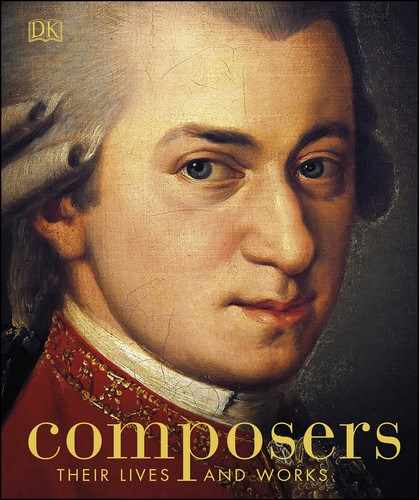György Ligeti
1923–2006, HUNGARIAN
One of the most original composers to emerge in the second half of the 20th century, Ligeti developed an individual style that embraced the avant-garde while still respecting musical tradition.

GYÖRGY LIGETI, 1965
During World War II, Ligeti was sent to a labor camp, his younger brother to a concentration camp, and his parents to Auschwitz. Only he and his mother survived the war. Then, in 1956, after Russia crushed the liberal government, he was forced to flee Hungary, hiding under mailbags in a train that took him close to the Austrian border. Such nightmarish events are variously worked through in his music. Ligeti is shown here in less harrowing times, in his forties, during his most productive period when his reputation as a leading composer was secure.
ON TECHNIQUE
Micropolyphony
After World War II, a number of composers, especially in Central and Eastern Europe, adopted a technique using massive clusters of notes to form “blocks” of sound, in which texture takes precedence over the traditional parameters of harmony and melody. Not satisfied with the necessarily static nature of these cluster chords, Ligeti developed the technique a stage further, superimposing a large number of independent melodies (what he called “micropolyphony”), so that the individual parts are indiscernible, and the block is perceived as a dynamic, constantly changing whole.

LIKE LIGETI'S MICROPOLYPHONY, THESE STARLINGS APPEAR AS A SINGLE ENTITY
That he was born in Transylvania, with all its Gothic horror associations, later appealed to György Ligeti’s dark sense of humor. He came from a Hungarian Jewish family, and was born in 1923, next to a synagogue in Dicsöszentmárton (now Târnăveni) in Romania's Transylvania region. The family later moved to the city of Cluj, where Ligeti began his studies at the local conservatory in 1941.

LE GRANDE MACABRE
The English National Opera performs Ligeti's "anti-anti opera" Le Grand Macabre at the London Coliseum in 2009. It was his only opera and his longest work.
Dark and fearful times
There was a great deal of political uncertainty in the region at that time: Hungary had annexed Northern Transylvania. As Hungarian speakers, the Ligetis were safe, but as Jews, they faced an increasing threat as the Nazis spread across Europe. In 1944, Ligeti was arrested and sent to a labor camp.
The following year, having survived the war, he returned to his studies, now at the Franz Liszt Academy of Music in Budapest, under the aegis of composer Zoltán Kodály. Following in the footsteps of Kodály and Bartók, Ligeti adopted a quasi-nationalist, folk-tinged style, largely because he had very limited access to new music from elsewhere in Europe. He graduated in 1949, and went on to teach at the Liszt Academy. That year he also married his first wife, Brigitte, but this ended in divorce three years later, when he married Veronika (known as Vera) Spitz—not a love match, but to prevent her deportation due to her bourgeois background. After Stalin’s death in 1954, they felt it was safe to divorce, but remained friends.
Their optimism was short-lived. In 1956, the Hungarian Revolution was brutally quashed by Soviet forces, and Ligeti fled with Vera to Vienna. They then made their way to Cologne, where Ligeti was offered work with Karlheinz Stockhausen in the Electronic Music Studio, and he and Vera remarried, this time in earnest.
In Cologne he had his first real contact with current trends in music, and slowly learned to absorb these into his own compositions. One of his most productive periods was during the 1960s, when he wrote many of his best-known pieces (and achieving some popularity through their use in films by Stanley Kubrick), including Atmosphères, the Requiem, Lux aeterna, Lontano, and the Absurdist theatrical pieces Aventures and Nouvelles Aventures, which showed his darkly humorous side.
He and Vera had a son, Lukas, in 1965, and Ligeti took Austrian citizenship in 1968. By this time, his reputation had been secured and his music was being performed worldwide. After a brief period in the US, he was appointed professor of composition at the Hamburg University of Music and Theater in 1973, where he taught until 1989. During this period, his style changed from the textural blocks of sound that characterized his early mature style, to a more rhythmic and strictly structured style, influenced by US Minimalism. He also concentrated at this time on his grotesque, Absurdist “anti-anti opera” Le Grand Macabre.
Ligeti spent most of his last years working on three books of piano Etudes and concertos for various instruments and orchestra, but failing health affected his output more and more, and he withdrew into seclusion. He died in Vienna in 2006, aged 83.

POEME SYMPHONIQUE, 2018
Members of Alarm Will Sound chamber orchestra with US conductor Alan Pierson (center) perform Ligeti's Poème symphonique (1962)—written for 100 metronomes—in the program This Music Should Not Exist. In the performance at Zankel Hall, New York, Ligeti's music was interspersed with music by Anton Seifert, Stockhausen, and Charlie Chaplin.
